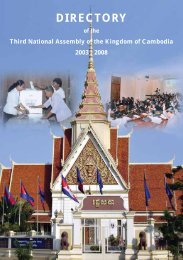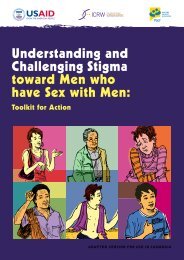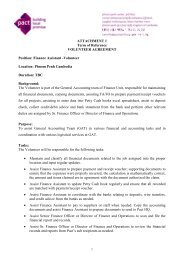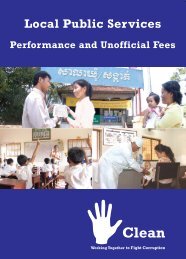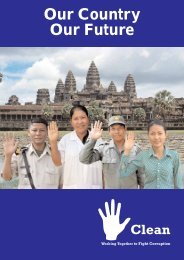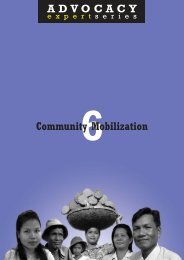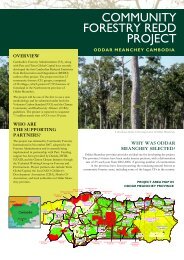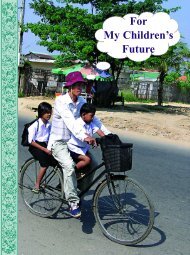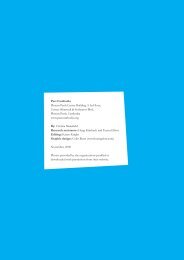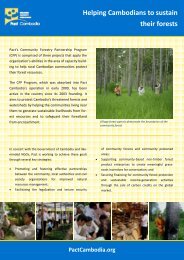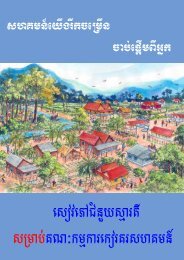Advocacy in Cambodia: Increasing Democratic ... - Pact Cambodia
Advocacy in Cambodia: Increasing Democratic ... - Pact Cambodia
Advocacy in Cambodia: Increasing Democratic ... - Pact Cambodia
You also want an ePaper? Increase the reach of your titles
YUMPU automatically turns print PDFs into web optimized ePapers that Google loves.
Kompong Som for allegedly <strong>in</strong>cit<strong>in</strong>g residents to<br />
protest the dump<strong>in</strong>g of toxic materials from<br />
Taiwan near their community.<br />
Communities are becom<strong>in</strong>g <strong>in</strong>creas<strong>in</strong>gly<br />
frustrated by the comb<strong>in</strong>ation of escalat<strong>in</strong>g<br />
disputes and lack of resolution. Consequently,<br />
some communities are opt<strong>in</strong>g to take matters <strong>in</strong>to<br />
their own hands. In Koh Kong, after years of<br />
petition<strong>in</strong>g prov<strong>in</strong>cial authorities and the<br />
Department of Fisheries, illegal fish<strong>in</strong>g prompted<br />
one community to steal a boat and confiscate<br />
illegal fish<strong>in</strong>g gear (see boxes). In Pursat, a forest<br />
community seized illegally felled trees when<br />
forestry officials refused to take action. As<br />
previously mentioned, <strong>in</strong> Kompong Chhnang<br />
villagers dragged an illegal pump from a local pond<br />
and deposited it at the Department of Fisheries<br />
office. Often communities feel compelled to take<br />
direct action because law enforcement agencies,<br />
local authorities, and NGOs are not tak<strong>in</strong>g action<br />
themselves, and on the contrary, can sometimes<br />
be part of the problem. As communities have<br />
effectively no higher <strong>in</strong>dependent authority to<br />
which they can appeal, the only recourse for them<br />
is to put a stop to violations through direct action.<br />
Unfortunately, this can <strong>in</strong>crease conflict rather<br />
Communities are becom<strong>in</strong>g <strong>in</strong>creas<strong>in</strong>gly frustrated<br />
by the comb<strong>in</strong>ation of escalat<strong>in</strong>g disputes and lack<br />
of resolution. Consequently, some communities are<br />
opt<strong>in</strong>g to take matters <strong>in</strong>to their own hands. In the<br />
case of fisheries, this can take the form of seiz<strong>in</strong>g<br />
illegal fish<strong>in</strong>g nets like the one shown below <strong>in</strong><br />
Kompong Chhnang prov<strong>in</strong>ce.<br />
than lead to long-term reconciliation between<br />
parties.<br />
While some NGO workers feel comfortable<br />
deal<strong>in</strong>g with community-level conflict, most do<br />
not have experience <strong>in</strong> activism and feel helpless<br />
Fisheries Dispute: Villagers Take Action<br />
Srey Ambil District, Koh Kong<br />
In 2002, an NGO <strong>in</strong>itiated a project <strong>in</strong> Koh Kong to address villagers’ request for assistance <strong>in</strong> combat<strong>in</strong>g illegal<br />
fish<strong>in</strong>g <strong>in</strong> their prov<strong>in</strong>ce. S<strong>in</strong>ce villagers <strong>in</strong> Koh Kong rely on fish<strong>in</strong>g for an estimated 80% of their livelihoods, use of<br />
illegal fish<strong>in</strong>g gear and illegal fish<strong>in</strong>g by boats enter<strong>in</strong>g from Kompong Som was present<strong>in</strong>g a major problem. The<br />
NGO project aimed to facilitate communication between Koh Kong villagers and other fish<strong>in</strong>g communities, facilitate<br />
cooperation with<strong>in</strong> the fish<strong>in</strong>g community, and help people assert their rights. The project began by form<strong>in</strong>g fish<strong>in</strong>g<br />
groups <strong>in</strong> four villages and tak<strong>in</strong>g the groups to visit successful community fisheries projects <strong>in</strong> Riem National Park.<br />
Prior to 2002, village groups had submitted petitions to local authorities ask<strong>in</strong>g them to solve the illegal fish<strong>in</strong>g<br />
problem and combat the use of illegal gear, such as the pompang (a net that catches even the smallest fish).<br />
Petitions were sent to village, commune, and district authorities, as well as to the governor. At one po<strong>in</strong>t, the<br />
governor asked a Department of Agriculture Officer to <strong>in</strong>vestigate. Upon do<strong>in</strong>g so, the DoA Officer confiscated illegal<br />
nets from neighbor<strong>in</strong>g villagers and asked net owners to sign their names on a document that said if they ever fished<br />
<strong>in</strong> the area aga<strong>in</strong> the government would take legal recourse. However, this measure did not solve the problem of<br />
boats enter<strong>in</strong>g from Kompong Som, a problem which was further compounded by the fact that people <strong>in</strong> Kompong<br />
Som had their own livelihood problems due to low fish<strong>in</strong>g catches from the sea. In addition, even though the government<br />
had confiscated illegal fish<strong>in</strong>g gear, the gear would eventually f<strong>in</strong>d its way back to its owner.<br />
Increas<strong>in</strong>g <strong>Democratic</strong> Space<br />
Frustrated with the lack of effective action, <strong>in</strong> January 2002, 15 people from one village went to a neighbor<strong>in</strong>g village<br />
and stole a boat that conta<strong>in</strong>ed illegal fish<strong>in</strong>g gear. The gear was removed. The follow<strong>in</strong>g day, the boat owner<br />
negotiated with villagers to return the boat and gear. An agreement was made that the villagers would not impose<br />
any f<strong>in</strong>es at that time, but that if the problem reoccurred they would remove the gear and f<strong>in</strong>e the owner Riel 20,000<br />
($5) for every kilogram of his personal weight, a common way of calculat<strong>in</strong>g f<strong>in</strong>es <strong>in</strong> <strong>Cambodia</strong>. Villagers expla<strong>in</strong>ed<br />
that they were not <strong>in</strong>terested <strong>in</strong> the f<strong>in</strong>es as much as <strong>in</strong> putt<strong>in</strong>g a halt to illegal fish<strong>in</strong>g. They felt they needed to take<br />
direct action because the government had not been able to put a stop to fish<strong>in</strong>g violations.<br />
React<strong>in</strong>g to the above <strong>in</strong>cident, local authorities said it would be best for villagers not to engage <strong>in</strong> direct action<br />
because one day they might cross paths with a boat owner with a gun. NGO staff felt that the villagers had the right<br />
to take action due to cont<strong>in</strong>ued fish<strong>in</strong>g violations that were not solved through government channels, though the NGO<br />
was not <strong>in</strong>volved with plann<strong>in</strong>g the <strong>in</strong>cident and was not present when the events took place.<br />
22



